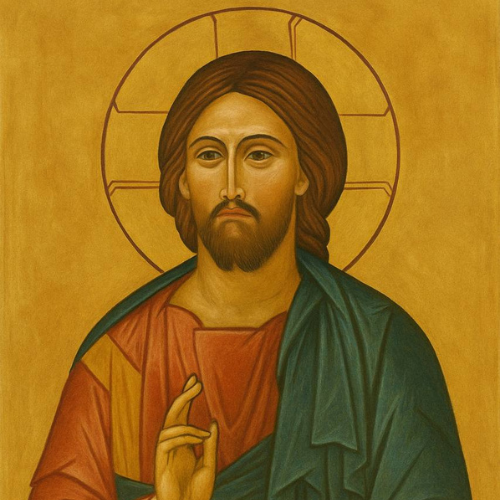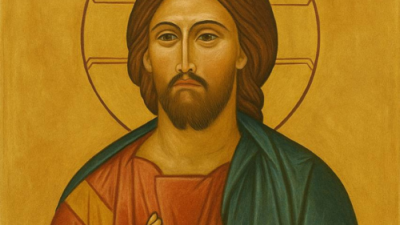Recently I received a letter from a sincere Christian woman with questions about the nature of Christ. These questions touch on the most important aspects of our faith, and I believe it would be helpful to share the answers with a wider audience. Perhaps similar questions are troubling other believers as well.
The Essence of the Question
The main thrust of the letter was that Christ supposedly could not have been born from Mary as an ordinary human because He is holy and sinless God, while Mary is a sinful daughter of Adam. According to the letter’s author, if the Divine nature had united with human flesh, that flesh would have been instantly incinerated. Therefore, as the listener claims, God the Father gave His Son special “heavenly flesh” that only looked human but had no sinful origin. Mary, according to this view, was merely a “surrogate mother” who carried an already-formed divine fetus but did not give Him her human nature. In support of her position, the author refers to Christ’s transfiguration and John’s vision on Patmos where Christ’s glory was revealed, and she interprets the apostle John’s words about Christ “coming in the flesh” in a special way, claiming it refers to heavenly rather than earthly flesh. These views are very close to the ancient heresy of Docetism, which was condemned in the early centuries of Christianity.
About Honoring Mary and the Death of Preachers
Listener’s question:
“Just today Yarl Nikolayevich Peysti’s sermon was broadcast. Earlier, Igor Valentinovich Tsyba addressed a similar topic, calling for more attention to Christ’s earthly mother Mary, which Scripture does not justify in any way. A week after this he passed away…”
My response:
Indeed, we must be careful not to elevate Mary above the place Scripture gives her. However, the Bible does speak of her special role. The angel calls her “favored one” (Luke 1:28), and Elizabeth exclaims: “Blessed are you among women… But why is this granted to me, that the mother of my Lord should come to me?” (Luke 1:42-43). Mary herself prophesies: “For behold, henceforth all generations will call me blessed” (Luke 1:48).
As for the death of preachers—let’s be careful in our judgments. Scripture teaches us: “To everything there is a season, and a time to every purpose under heaven” (Ecclesiastes 3:1). Linking someone’s death to their preaching is something Christ Himself warned against when He spoke of those who died when the tower of Siloam fell: “Do you think that they were worse sinners than all others?” (Luke 13:4).
About the Impossibility of Christ’s Birth from Mary
Listener’s question:
“Christ could not have been born as a human from a woman because He is heavenly, holy, sinless, eternal Spirit, while Mary is earthly, from Adam’s sinful, corruptible flesh. If the Son of God had descended in His majesty into human flesh, it would have been instantly incinerated. Can the Creator merge with creation?”
My response:
This concern about how holy God could unite with sinful human nature is understandable. It is indeed a great mystery! But let’s look at what Scripture says.
The apostle Paul writes: “But when the fullness of time had come, God sent forth His Son, born of a woman, born under the law, to redeem those who were under the law” (Galatians 4:4-5). Notice—”born of a woman,” not just “through a woman.”
In Hebrews we read: “Since therefore the children share in flesh and blood, He Himself likewise partook of the same things, that through death He might destroy the one who has the power of death… Therefore He had to be made like His brothers in every respect” (Hebrews 2:14, 17). How could He be like us if He didn’t take our nature?
Regarding “incineration”—remember how God appeared to people in the Old Testament. The burning bush didn’t burn up (Exodus 3:2), Moses saw God and remained alive (Exodus 33:11). If God could preserve a bush from burning, couldn’t He preserve human nature when taking it on? Moreover, Paul writes: “Who, though He was in the form of God… emptied Himself, by taking the form of a servant, being born in the likeness of men” (Philippians 2:6-7).
About Christ’s “Heavenly Flesh”
Listener’s question:
“Couldn’t the all-wise God the Father have found appropriate flesh for His Son that would be similar to earthly flesh and blood but wouldn’t have a sinful origin? The Son of God had to offer Himself as a substitutionary sacrifice… remaining God in His heavenly flesh.”
My response:
The idea that Christ had special “heavenly flesh” was known in the early Church as the heresy of Docetism. This is precisely what the apostle John opposed: “Every spirit that confesses that Jesus Christ has come in the flesh is from God, and every spirit that does not confess Jesus Christ has come in the flesh is not from God. This is the spirit of the antichrist” (1 John 4:2-3).
Scripture clearly says that Christ took our very nature: “God has done what the law, weakened by the flesh, could not do. By sending His own Son in the likeness of sinful flesh and for sin, He condemned sin in the flesh” (Romans 8:3). Not in heavenly flesh, but in “the likeness of sinful flesh”—that is, in real human nature, but without personal sin.
About Christ’s Words “I Am the Living Bread”
Listener’s question:
“Christ Himself said about Himself: I am the living bread that came down from heaven. And this bread is My flesh, which I will give for the life of the world.”
My response:
Yes, Christ said these words (John 6:51). But notice the context. He says: “And the bread that I will give for the life of the world is My flesh” (John 6:51). What flesh did He give on the cross? The very flesh He received from Mary!
After all, at the beginning of the same Gospel, John writes: “And the Word became flesh and dwelt among us” (John 1:14). The Greek word “flesh” (σάρξ) means ordinary human nature, not some special heavenly substance.
About the Transfiguration and Vision on Patmos
Listener’s question:
“On the mount of transfiguration Christ pulled back the veil… John also saw Him this way on the island of Patmos… God once said that no one can see His face and live…”
My response:
Yes, the transfiguration and the vision on Patmos show Christ’s majesty. But this doesn’t cancel His true humanity! After the resurrection, Christ tells the disciples: “See My hands and My feet, that it is I Myself. Handle Me and see, for a spirit does not have flesh and bones as you see I have” (Luke 24:39).
The transfiguration showed the glory that was hidden in Christ’s human nature, but it didn’t cancel that nature. Peter, who witnessed the transfiguration, later wrote: “He Himself bore our sins in His body on the tree” (1 Peter 2:24).
About Mary as a “Surrogate Mother”
Listener’s question:
“Mary was not His biological mother, but only a surrogate… Christ was incarnated through the Holy Spirit’s action not into Mary’s egg, as all theologians say, but into Mary’s womb… Behold, the virgin shall conceive and bear a son.”
My response:
Let’s carefully read the angel’s words to Mary: “The Holy Spirit will come upon you, and the power of the Most High will overshadow you; therefore the child to be born will be called holy—the Son of God” (Luke 1:35).
The Greek word “to be born” (τὸ γεννώμενον) indicates the process of birth from Mary, not just carrying. Moreover, Paul speaks of Christ as “descended from David according to the flesh” (Romans 1:3). How is this possible if He didn’t take flesh from Mary, David’s descendant?
Scripture repeatedly calls Mary the “mother” of Jesus (Matthew 1:18; 2:11; Luke 2:33-34; John 2:1; 19:25). Elizabeth calls her “the mother of my Lord” (Luke 1:43). If she were only a “surrogate mother,” such consistent use of the word “mother” would be strange.
About the Interpretation of 1 John 4:2-3
Listener’s question:
“The apostle John wrote that whoever does not confess Jesus Christ coming in the flesh is a deceiver and antichrist, but he didn’t mean born in the flesh from a woman, but rather coming from heaven in heavenly flesh…”
My response:
This interpretation contradicts the entire context of John’s letter. He was fighting precisely those who denied Christ’s true humanity. In the same letter he writes: “That which was from the beginning, which we have heard, which we have seen with our eyes, which we looked upon and have touched with our hands” (1 John 1:1). Can one touch “heavenly flesh”?
The Greek expression “come in the flesh” (ἐν σαρκὶ ἐληλυθότα) means precisely taking on real human flesh. If John had meant a special heavenly substance, he would have used different words.
Why This Matters for Our Salvation
Dear friends, if Christ didn’t take our nature, how could He redeem it? The ancient theologian Gregory of Nazianzus said: “What is not assumed is not healed.” If Christ didn’t become truly human, we remain unredeemed.
Scripture says: “For our sake He made Him to be sin who knew no sin, so that in Him we might become the righteousness of God” (2 Corinthians 5:21). How could He become a sacrifice for human sin without taking human nature?
Remember the words from Hebrews: “For because He Himself has suffered when tempted, He is able to help those who are being tempted” (Hebrews 2:18). If He had special “heavenly flesh,” how could He understand our weaknesses?
A Word of Encouragement
Dear brothers and sisters, I understand that these truths are difficult to comprehend. The apostle Paul calls the incarnation the “great mystery of godliness”: “He was manifested in the flesh” (1 Timothy 3:16). This truly surpasses human understanding!
But let’s hold to the simplicity of the Gospel and what is clearly revealed in Scripture. Christ is true God and true man. He was born of the Virgin Mary, lived among us, suffered, died, and rose again for our salvation.
Let’s not add to the Gospel what isn’t there. The idea of “heavenly flesh” may seem pious, but it leads us away from biblical truth and, more importantly, from the comfort that comes from knowing our Savior truly became one of us.
Conclusion
I pray that the Holy Spirit will enlighten our hearts to understand this great mystery. Let’s hold together to the fact that “All Scripture is breathed out by God and profitable for teaching” (2 Timothy 3:16), neither adding to nor taking away from it.
If you have similar questions, don’t hesitate to ask them. Remember, we are all learning and growing in the knowledge of our Lord Jesus Christ.
May the Lord bless you and keep you in the truth of His Word!
With love in Christ,
Paul Natekin
P.S. I recommend everyone study the Creed adopted at the Council of Chalcedon (451 AD), which clearly sets forth the doctrine of Christ’s two natures. It would also be helpful to reread the first chapters of Matthew and Luke, which describe the Savior’s birth in detail. May God’s Word be a lamp to our feet and a light to our path (Psalm 119:105).



